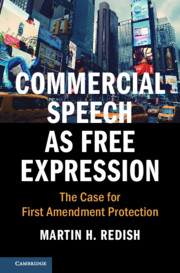Book contents
- Commercial Speech as Free Expression
- Cambridge Studies on Civil Rights and Civil Liberties
- Commercial Speech as Free Expression
- Copyright page
- Dedication
- Contents
- Preface
- Acknowledgments
- 1 Commercial Speech and the Values of Free Expression
- 2 False Commercial Speech and the First Amendment
- 3 The Right of Publicity, Commercial Speech, and the Equivalency Principle
- 4 Compelled Commercial Speech and the First Amendment
- 5 Scientific Expression and Commercial Speech
- Conclusion
- Index
1 - Commercial Speech and the Values of Free Expression
Published online by Cambridge University Press: 21 May 2021
- Commercial Speech as Free Expression
- Cambridge Studies on Civil Rights and Civil Liberties
- Commercial Speech as Free Expression
- Copyright page
- Dedication
- Contents
- Preface
- Acknowledgments
- 1 Commercial Speech and the Values of Free Expression
- 2 False Commercial Speech and the First Amendment
- 3 The Right of Publicity, Commercial Speech, and the Equivalency Principle
- 4 Compelled Commercial Speech and the First Amendment
- 5 Scientific Expression and Commercial Speech
- Conclusion
- Index
Summary
For most of the nation’s history, commercial speech has been the First Amendment’s pariah. Commercial advertising was viewed by judges and scholars alike as inherently intertwined with property rights, rather than the First Amendment’s right of free expression. Over the last four decades, however, that situation has changed dramatically. Though purporting to provide commercial speech only an intermediate level of scrutiny, the Court has developed a highly protective standard for this communicative category. Nevertheless, there remain a number of significant differences in the Court’s interpretation of the First Amendment between commercial and noncommercial speech that still treat commercial speech as far less worthy of constitutional protection. This chapter provides a new framework of First Amendment analysis, called the “perspective framework,” which demonstrates that, as a matter of both logic and the foundations of First Amendment theory, commercial speech deserves a level of protection equivalent to that given noncommercial speech. The four perspectives of free speech theory put forward in this chapter are the speaker perspective, the listener perspective, the regulatory perspective, and the rationalist perspective. Application of each of these perspectives, the chapter argues, dictates the “equivalency principle” advocated throughout this book. However, while the equivalency principle dictates that commercial and noncommercial speech be measured by the very same standards, it will not always follow that both will receive protection under the same circumstances. In certain instances, because of surrounding circumstances commercial speech may give rise to the danger of more significant harm than would comparable noncommercial speech. But the point made throughout the book is that if this conclusion is to be reached, it is because of a variance in the danger of harm caused by the speech, rather than because of an assumed lesser value of commercial speech. After this chapter provides a theoretical model for measuring free speech protection and explains the reasons that reduced protection for commercial speech violates that model, the remaining chapters apply that theoretical framework to specific doctrinal areas of First Amendment jurisprudence.
Keywords
- Type
- Chapter
- Information
- Commercial Speech as Free ExpressionThe Case for First Amendment Protection, pp. 1 - 20Publisher: Cambridge University PressPrint publication year: 2021



